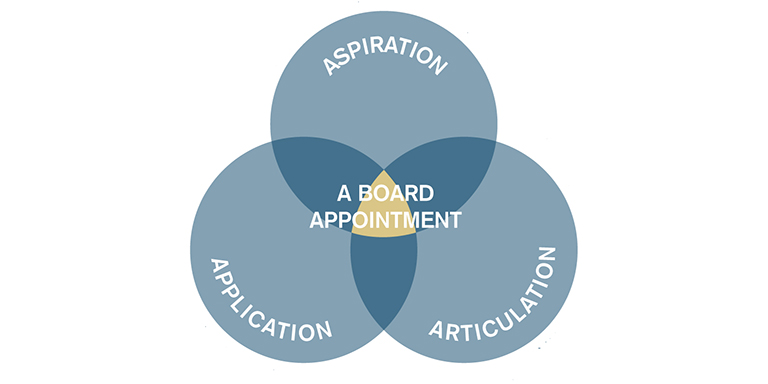Imagine you were at an event, picking your kids up from school, or a sporting event; you get talking to someone and they ask you what you do. What do you say? Like many, you will likely revert to your executive experience and the conversation will revolve around this topic. However, if your desire is for a board appointment then this must change. One of the most valuable things you can do to gain a board appointment is to simply start telling people you are looking for one.
This is surprisingly easy and goes a long way to access the huge number of roles that will never be advertised. However, telling people about your board aspirations is just part of the task ahead. As always, the devil is in the detail because, if you do start telling people then you need to be able to be ready for the subsequent question – ‘what sort of board are you looking for?’
As such, defining your Aspirations – the organisation you think you want and can be appointed to – must be your first step, and being specific is critical. In my last article, I listed the eight questions to ask yourself to help you develop a list of your target organisations.
Why do you need to be so specific about your board aspirations?
It is the Fundamental Attribution Error. Malcolm Gladwell writes about this in his bestselling book, Tipping Point. He writes that the Fundamental Attribution Error stems from the fact that people
‘instinctively want to explain the world around them in terms of people’s essential attributes.’
In other words, people do not take into account the setting, culture or external influences when meeting, and remembering people. Rather, they focus on immediately graspable facts. So, ignorant of context, people will ‘peg’ (brand) you in one way or another and are unlikely to hold differing views simultaneously.
What does the Fundamental Attribution Error have to do with your board search?
Essentially, you need to realise that you are going to get ‘pegged’ – it is up to you how they peg you.
So… ask yourself how people you meet, or indeed those that know you, know you? Or, how do they recall you to others? Whether it be meeting someone for the first time or a close friend, family member or a colleague it is up to you to frame or reframe the way people know you. Because, for the vast majority of people, particularly those who aspire to a board appointment, they are often not associated with their board aspirations or becoming a NED.
Instead, they are more likely branded by a relationship (father, mother, sister, or brother), by an executive function (an accountant, a lawyer, a busy executive, or retiree) or perhaps instead by an extra-professional activity like the sport or charity work they are involved with or maybe the skills they have HR, IT, Marketing, etc.
Others perspective of you needs to change if you want a board appointment otherwise you will be missing out on countless opportunities.
How to ensure you get pegged as a Non-Executive Director
Tell people: Remember they only know what you tell them so tell them about your board aspirations. That means you need to move away from framing yourself as an executive, friend or colleague or an unknown quantity. For example, if you meet someone for the first time…Them: ‘Nice to meet you. What do you do?’ You: ‘I am the (title) at (company name) but I am building a board career/ looking for a board appointment.
If you do this you then I can almost guarantee people will remember you differently and the conversation will head in a direction that will open up opportunities for you. However, to manage these conversations need to also be ready for the subsequent question.
What boards are you interested in?
Answering this question specifically is so important and the reason my previous articles addressed this subject in detail.
What does it all mean for your board search?
First impressions count and those you meet are going to only be able to remember you in a very narrow way. That means telling people you meet about your board aspirations.
Equally, the existing relationships you have need to be reframed too. Ask yourself how many people that know you well know that you are looking for a board appointment? I am guessing that it is not enough. If that is the case you must change that.
In summary
It’s unlikely that you are going to be ‘pegged’ as a Non-Executive without specifically telling people of your board aspirations and changing the language you use to introduce yourself. The FAE reaches further too. It must impact the content and structure of your Board CV, your Board Applications and your Board Interviews. Understanding it and its impact truly is a crucial part of your board search and should revolutionise the way you frame yourself. Doing so will help you dare them not to appoint you.
Once you understand the Fundamental Attribution Error, you can start thinking about how you can create a compelling board pitch to your target organisations. Use language that articulates your value at board level. I will lead you to more appropriate responses in the future. Remember, just telling people about your board aspirations is absolutely critical.
Join my Private Facebook Group to continue the conversation?
If you would like to chat with me and others about everything” board appointment” join my private Facebook Group – Let’s Talk Board Appointments.
⇒ Join Now ⇐
About the Author

David Schwarz is CEO & Founder of Board Direction – Australia’s leading board advertising and non-executive career support firm. He has over a decade of experience of putting people on boards as an international headhunter and a non-executive recruiter and has interviewed over one thousand non-executives and placed hundreds into some of the most significant public, private and NFP roles in the world
Share this article on your favourite platform!






